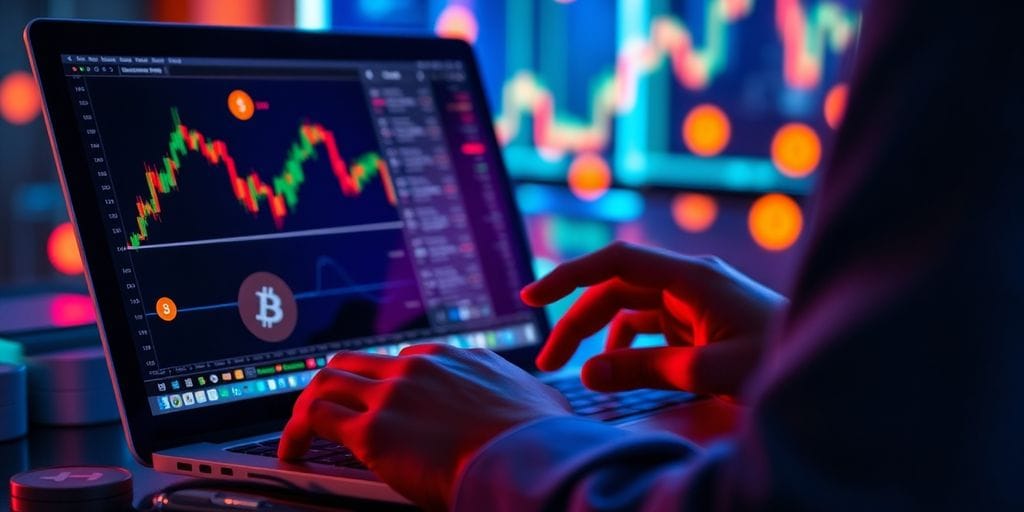Insider crypto trading is a hot topic in the digital asset world, especially as we move into 2025. With the rise of cryptocurrencies, the potential for using confidential information for personal gain has also surged. This article will break down what insider crypto trading really is, the risks it poses, and how regulations are evolving to tackle this issue. We’ll explore the challenges of detection, the role of technology, and some notable case studies that illustrate the ongoing battle against insider trading in the crypto space.
Key Takeaways
- Insider crypto trading refers to trading based on confidential information, giving certain traders an unfair edge.
- High-profile cases like Ishan Wahi and Alameda Research show the difficulties in regulating insider trading within the crypto market.
- Regulatory bodies are starting to enforce rules against insider trading, but the decentralized nature of crypto makes this a complex task.
- Investors should be cautious of the risks tied to insider trading, which can lead to financial losses and legal trouble.
- Technology, including data analytics and blockchain transparency, is essential for spotting and preventing insider trading activities.
Defining Insider Crypto Trading
What Constitutes Insider Crypto Trading?
Okay, so what exactly is insider crypto trading? It’s basically using secret information to make unfair profits in the crypto market. Think of it like this: someone knows something others don’t, and they use that knowledge to trade before the public finds out. It’s not cool, and it messes things up for everyone else. It’s like knowing the plot twist of a movie before you even buy your ticket. Insider trading in crypto involves using confidential information to gain an unfair advantage in trading digital assets.
The Impact of Non-Public Information
Non-public information is a big deal. It can move markets, and if you have it before anyone else, you’ve got a serious edge. Imagine knowing a coin is about to be listed on a major exchange. You could buy a bunch of it beforehand, and then watch the price jump when everyone else piles in. That’s the power of non-public information, and it’s why insider trading is such a problem. It creates an uneven playing field where some people have a huge advantage over others.
Comparing Insider Trading in Crypto and Traditional Markets
Insider trading isn’t a feature, it’s a bug. And unfortunately, it’s alive and well in the crypto world. It’s pretty much the same as in traditional finance. It’s when someone with access to confidential information about a company trades its stock or securities based on that information. In the world of cryptocurrency, it means trading based on non-public information about upcoming token launches or project developments. Just look at the recent Binance incident where an employee used privileged info from a previous role to outsmart a token launch. This guy made a ton of money before the rest of us even knew the opportunity existed. It’s a major blow to market integrity and trust. A study suggests that between 10% and 25% of new crypto listings on exchanges like Coinbase may have had insider trading activity. That’s a pretty big percentage of a market that’s supposed to be fair and transparent. The research estimates that these activities generated at least $1.5 million in illicit profits. Ouch.
Risks Associated with Insider Crypto Trading
Market Integrity and Trust Issues
Insider trading can really mess with how people see the crypto market. When some people have an unfair advantage, it makes everyone else think the game is rigged. It’s like playing poker when one person knows what cards everyone else has. Not fun, right? This erodes trust, and when people don’t trust the market, they’re less likely to invest. Less investment means less growth and innovation in the crypto space. The Binance employee incident is a prime example of how quickly trust can be damaged.
- Reduced investor confidence.
- Distorted market prices.
- Hindered market growth.
When trust erodes, the entire market suffers. It’s not just about the money lost in individual trades; it’s about the long-term viability and health of the crypto ecosystem.
Financial Risks for Investors
For regular investors, insider trading can lead to significant financial losses. If insiders are trading on non-public information, they can manipulate prices to their advantage, leaving others holding the bag. Imagine buying a coin right before a big dump because insiders knew bad news was coming. Ouch! It’s not a good feeling. This kind of manipulation can wipe out savings and discourage people from participating in the market.
- Unexpected price drops.
- Loss of investment capital.
- Increased market volatility.
Legal Consequences for Perpetrators
Engaging in insider crypto trading isn’t just unethical; it’s illegal, and the consequences can be severe. Regulatory bodies are cracking down on insider trading, and they’re not afraid to bring the hammer down. The Ishan Wahi case, for example, shows that authorities are serious about prosecuting crypto insider trading.
- Substantial fines.
- Potential jail time.
- Damage to professional reputation.
Detecting Insider Crypto Trading Activities
Methods for Identifying Insider Trading
Okay, so how do you even begin to spot insider trading in the crypto world? It’s not like it’s broadcasted, right? One of the biggest clues is unusual trading right before a major announcement. Think about it: if someone knows a coin is about to be listed on a big exchange, they might load up on it beforehand, causing the price to spike. It’s all about looking for patterns that just don’t seem right.
Here are a few things that might make you raise an eyebrow:
- Sudden, large buy orders that seem to come out of nowhere.
- A specific wallet suddenly holding a ton of a certain token right before a price jump.
- Whispers on social media hinting at insider knowledge – sometimes people can’t help but brag (or hint!).
It’s important to remember that just because you see one of these things doesn’t automatically mean it’s insider trading. But if you see a bunch of them happening at the same time, it’s worth digging a little deeper. It’s like a puzzle – one piece might not mean much, but several pieces together can paint a clear picture.
Role of Investigative Authorities
When insider trading is suspected, it’s up to the authorities to step in and investigate. This usually means agencies like the SEC (Securities and Exchange Commission) or the CFTC (Commodity Futures Trading Commission), depending on how the crypto asset is classified. They have the power to subpoena records, interview witnesses, and generally dig into the details to see if any laws were broken. These regulatory efforts are super important for keeping the market fair.
Their investigations usually involve:
- Analyzing trading data to spot suspicious patterns. It’s like looking for a needle in a haystack, but with computers!
- Tracing the flow of funds to see who benefited from the trades. Follow the money, right?
- Looking for connections between the traders and the people who had access to the inside information. Who knew who, and when did they know it?
Challenges in Detection
Let’s be real, catching insider traders in crypto is tough. The market is global, it operates 24/7, and it’s full of anonymous or pseudonymous accounts. Plus, the regulations are still catching up, which creates loopholes that can be exploited. It’s like trying to catch smoke with your bare hands. The decentralized nature of crypto makes it hard to track everything, and blockchain transparency isn’t always as transparent as we’d like it to be. It’s a constant game of cat and mouse, with the regulators trying to keep up with the latest tricks and techniques used by those trying to game the system.
Here are some of the specific challenges:
- Anonymity: It’s hard to know who’s behind a transaction when accounts can be pseudonymous.
- Global Reach: The market operates across borders, making it difficult to enforce regulations.
- Evolving Technology: New technologies and platforms are constantly emerging, creating new opportunities for insider trading.
Regulatory Landscape for Insider Crypto Trading

Current Regulations and Enforcement
The regulatory situation for insider crypto trading is still developing. It’s not as straightforward as in traditional stock markets. Some countries are trying to apply existing securities laws to crypto, which means insider trading rules could apply. However, the lack of specific crypto regulations in many places leaves openings for abuse. The SEC’s Crypto Task Force is working on closing those gaps, but it’s a gradual process.
- Applying existing securities laws.
- Creating new crypto-specific regulations.
- International cooperation to harmonize rules.
Challenges in Regulating Crypto Markets
Regulating crypto markets presents unique challenges. The decentralized nature of crypto makes it hard to track and control trading activities. It’s a global market that operates 24/7, and many users remain anonymous. These factors make it difficult for regulators to enforce existing laws and prevent insider trading.
It’s like trying to catch smoke with your bare hands. The technology moves so fast, and the regulations are always playing catch-up. Plus, the global nature of crypto means that regulators in one country might not have jurisdiction over activities happening in another.
Future Directions for Regulation
Looking ahead, the future of crypto regulation will likely involve a combination of approaches. This includes clearer definitions of what constitutes a security in the crypto space, increased international cooperation, and the development of new technologies to monitor and detect insider trading. The goal is to create a regulatory framework that protects investors without stifling innovation. We need to see more regulatory efforts to protect the market.
- Developing clear definitions of crypto assets.
- Enhancing international cooperation among regulatory bodies.
- Investing in technology to monitor and detect insider trading.
Technological Solutions to Combat Insider Trading

Data Analytics and Monitoring Tools
Data analytics is becoming a key weapon in the fight against insider trading. By analyzing huge amounts of trading data, price movements, and wallet activity, analysts can spot patterns that might indicate illegal activity. It’s like having a detective constantly watching the market, looking for anything out of the ordinary. These tools can monitor news and social media for potential leaks of insider information, predict potential insider trading activity based on historical data, and automate the investigation of potential cases.
Blockchain Transparency
Blockchain’s transparency is a double-edged sword. Every transaction is recorded on a public ledger, which should make it easier to trace funds and identify suspicious patterns. However, people are getting clever, using privacy coins and mixing services to hide their tracks. It’s a constant game of cat and mouse. The inherent transparency of blockchain offers a unique advantage in the fight against insider trading.
The Role of Fintech in Compliance
Fintech companies are developing innovative solutions to help exchanges and other crypto businesses comply with regulations and prevent insider trading. These solutions include:
- Automated monitoring systems: These systems can automatically flag suspicious transactions and activity.
- KYC/AML solutions: Fintech is improving AML and KYC policies to make it harder for insider traders to hide their identities.
- Secure communication channels: Fintech can provide secure channels for sharing information within companies, reducing the risk of leaks.
Fintech is playing a big role in making the crypto market safer and more trustworthy. It’s not a perfect solution, but it’s a step in the right direction. By using technology to monitor trading activity, verify identities, and secure communications, fintech companies are helping to level the playing field for all investors.
Case Studies of Insider Crypto Trading
The Ishan Wahi Incident
The Ishan Wahi case is a prime example of crypto insider trading. Wahi, a former Coinbase product manager, leaked confidential information about upcoming token listings on the exchange. This allowed his brother and a friend to make substantial profits by purchasing the tokens before the public announcement. The SEC brought charges, highlighting the seriousness with which regulators view such actions. This case underscored the importance of crypto insider trading regulations and their enforcement.
Alameda Research and Market Manipulation
Alameda Research, closely tied to FTX, has been under scrutiny for various market activities. While not strictly an insider trading case in the traditional sense, allegations of market manipulation and using privileged information to gain an unfair advantage have surfaced. This involves:
- Using FTX customer funds for trading activities.
- Potentially front-running trades based on internal knowledge.
- Artificially inflating the price of certain assets.
The Alameda situation highlights the blurred lines between legitimate trading strategies and unethical, potentially illegal, behavior when internal information and market access are combined.
Lessons from the Binance Case
Binance, one of the largest cryptocurrency exchanges, has also faced insider trading allegations. In one instance, an employee was accused of using non-public information to profit from trading activity. This incident, while not as widely publicized as the Wahi case, serves as a reminder that insider trading risks exist even within established exchanges. The key takeaways include:
- The need for robust internal controls to prevent information leaks.
- The importance of monitoring employee trading activity.
- The potential for reputational damage, even if the financial gains are relatively small.
| Case Study | Key Issue | Outcome/Impact |
|---|---|---|
| Ishan Wahi | Leaking Coinbase listing information | SEC charges, highlighting regulatory focus. |
| Alameda Res. | Market manipulation, misuse of funds | Increased scrutiny, potential legal repercussions. |
| Binance | Employee using inside information | Reinforces the need for internal controls and monitoring. |
Ethical Considerations in Insider Crypto Trading
The Importance of Transparency
Transparency is super important in the crypto world. Without it, things get messy fast. When everyone can see what’s going on, it’s harder for shady stuff like insider trading to happen. Think of it like a well-lit room – you can spot problems easier than in the dark. It’s not just about avoiding legal issues; it’s about making the whole system work better for everyone.
- Open communication channels
- Clear disclosure policies
- Regular audits of trading activities
Building Trust in the Crypto Market
Trust is everything. If people don’t trust the crypto market, they won’t use it. And insider trading? That kills trust faster than anything. It makes people think the game is rigged, and honestly, sometimes it is. But we can fix that. By cracking down on insider trading and promoting ethical behavior, we can build a market that people actually believe in. The Binance incident really shook some people’s faith, but it also showed that these things can be caught and addressed.
- Fair trading practices
- Investor protection measures
- Strong regulatory oversight
Encouraging Ethical Trading Practices
It’s not enough to just say, "Don’t do insider trading." We need to actively encourage ethical behavior. That means educating people about the risks and consequences, setting clear standards, and rewarding good behavior. It’s about creating a culture where doing the right thing is the norm, not the exception. Think of it as building a community where everyone plays fair. It’s a long game, but it’s worth it. Ethical trading practices are not just about avoiding legal trouble; they’re about building a sustainable and trustworthy crypto ecosystem. It’s about fostering a sense of responsibility among all participants, from exchanges to individual traders.
Ethical trading practices are not just about avoiding legal trouble; they’re about building a sustainable and trustworthy crypto ecosystem. It’s about fostering a sense of responsibility among all participants, from exchanges to individual traders.
Here are some ways to encourage ethical trading:
- Education programs for traders
- Whistleblower protection policies
- Incentives for ethical behavior
Final Thoughts on Insider Crypto Trading
To wrap things up, insider trading in the crypto world is a big deal that we can’t just brush aside. It’s a lot like what happens in traditional finance, but the digital space has its own set of problems. Recent events, like the Binance case, really show how serious this issue is. We definitely need better rules to keep things fair for everyone. Investors should have a fair shot, and that means cracking down on those who use secret info for their own gain. As the crypto market keeps growing, focusing on transparency and accountability is key. If we want this space to thrive, we all need to pitch in and make it safer and more trustworthy.
Frequently Asked Questions
What is insider crypto trading?
Insider crypto trading is when someone uses secret information about a cryptocurrency to buy or sell it before the news is made public. This gives them an unfair edge.
How does insider trading affect the market?
Insider trading can damage trust and fairness in the market. When some people have secret information, it can lead to unfair profits and losses for others.
Can you give examples of insider trading in crypto?
Sure! One example is Ishan Wahi, who revealed information about new listings on Coinbase. Another case involved Binance, where an employee used inside knowledge to profit.
What are the risks of insider crypto trading?
The risks include losing trust in the market, financial losses for regular investors, and legal penalties for those who take part in it.
How can insider trading be detected?
Detecting insider trading often involves looking at trading patterns and historical data. Authorities search for unusual trading activities that might be linked to secret information.
What can be done to prevent insider trading in crypto?
To prevent insider trading, companies can set strict rules against using secret information, encourage people to report suspicious activities, and promote fair trading practices.










